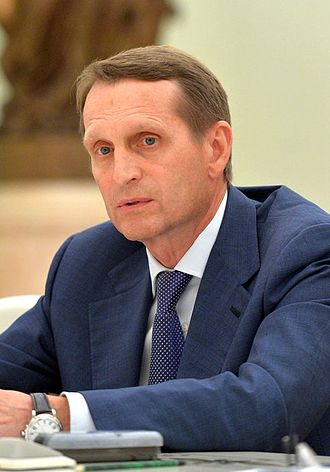
Sergey Yevgenyevich Naryshkin (Russian: Серге́й Евге́ньевич Нары́шкин, IPA: [sʲɪrˈɡʲej jɪˈvɡʲenʲɪvʲɪtɕ nɐˈrɨʂkʲɪn]; born 27 October 1954) is a Russian official, politician, businessman and the Director of the Foreign Intelligence Service since 2016. Previously, he was Chairman of the State Duma (2011–2016) and Kremlin Chief of Staff (2008–2012); he was also chairman of the Historical Truth Commission in May 2009 until it was dissolved in February 2012.
Contents
- 1Early life and education
- 2Career
- 3Chairman of the State Duma
- 4Membership in advisory and scientific councils and commissions
- 5Sanctions
- 6Notes
- 7References
- 8External links
Early life and education
Sergei Yevgenyevich Naryshkin was born in Leningrad and graduated from Leningrad Institute of Mechanics with a degree in engineering in 1978, and, in 1978, he was the first secretary of its Komsomol which was the Communist Party‘s youth wing. From 1978, Naryshkin studied at the Moscow Higher School of the KGB (Russian: Высшая школа КГБ) for two years in the French section while Nikolay Tokarev also studied at the Higher School of the KGB at the same time.[1] In the 1990s he also graduated from International Management Institute of Saint Petersburg with a degree in economics.[2]
In 2015, Naryshkin’s dissertation in economics was exposed as fraudulent in an investigation by Dissernet, with more than half of the text plagiarized from other publications.[3]
Career
Naryshkin meeting with Kyrgyz President Roza Otunbayeva during his working visit to Bishkek in August 2011.
In 1982, Naryshkin was appointed Deputy Vice-Rector of Leningrad Polytechnical Institute. From 1988 to 1992, he worked in the Soviet Embassy in Brussels as an expert in the State Committee on Science and Technologies in the office of the economic adviser, but Alexei Pastyukhov, a childhood friend, stated that Naryshkin worked as third secretary. Some sources suggest that while there he began to work for the KGB after he had been at a group of the KGB Higher School where he and Vladimir Putin were fellow students.[2][4][5][6]
From 1992 until 1995, he worked in the Committee for Economy and Finance of Saint Petersburg Mayor Office. After he left, he became the chief of the external investment department of Promstroybank—a position he would hold until 1997. From 1997 until 1998, Naryshkin led the Investment Department of the Leningrad Oblast government. From 1998 until 2004, he was the Chairman of the Committee for External Economic and International Relations of the government of Leningrad Oblast.
In early 2004, he was a deputy head of the economic department of the Russian presidential administration. From March through September 2004, Naryshkin was a deputy chief of staff of the Russian government.
Since 2004, he has been a member of the board of directors of Sovkomflot and a deputy chairman of the board of directors of Rosneft. Since 31 August 2004, Naryshkin has also been Chairman of the Board of Directors of Channel One of the Russian television.
Since 13 September 2004, he has been a Minister, Chief of Staff of the Government of Russia. On 15 February 2007, President Vladimir Putin announced that Naryshkin had been appointed Deputy Prime Minister of Russia for external economic activity, focusing on collaboration with the Commonwealth of Independent States. In May 2008, Naryshkin was appointed chief of the Presidential Administration of Russia.
In May 2009, President Dmitry Medvedev appointed him chairman of the Historical Truth Commission.
Since the rise of tensions between European Union and Russia in 2014, Naryshkin was perceived as one of the main coordinators of contacts with European far-right and far-left parties supporting Russian foreign policy in Europe.[7]See also: Russia-European Union relations
In September 2016, Naryshkin was appointed as chief of Russia’s Foreign Intelligence Service (SVR).[8]
In December 2021, Naryshkin dismissed reports of a possible invasion of Ukraine asserting that it was “malicious propaganda by the US State Department”.[9]
Chairman of the State Duma
President Putin with Chairwoman of the Federation Council Matviyenko and Naryshkin, 2 September 2013
Naryshkin was elected to the State Duma, the lower house of the Russian parliament in December 2011. When the Duma began meeting for its new term on 21 December 2011, Naryshkin was elected as Chairman of the State Duma; he received 238 votes in favor of his candidacy, while 88 deputies opposed him.[10] In June 2012, Naryshkin signed a resolution on setting up a culture council under the State Duma speaker. The council is “a standing advisory body”. The tasks of the council are “the examination and drafting of initiatives on topical problems of legislative regulations in culture and associated industries, the development of recommendations on culture for the use in lawmaking”.[11] On 2 September 2013, Naryshkin stated that there are no political prisoners in today’s Russia.[12]
Membership in advisory and scientific councils and commissions
Naryshkin is the Chairman of the Board of Trustees The Russian Presidential Academy of National Economy and Public Administration (RANEPA).[13]
Sanctions
As a result of the 2014 Crimean crisis, the federal government of the United States under Barack Obama blacklisted[a] Naryshkin and other close friends of the Russian president, including Sergei Ivanov and Gennadi Timchenko.[14][15][16][17][18][19] Nevertheless, he officially visited the U.S., along with other Russian top security chiefs, at the end of January 2018.[20]
Notes
- ^ He was placed on the Specially Designated Nationals List (SDN), a list of individuals sanctioned as “members of the Russian leadership’s inner circle.”
References
- ^ Шлейнов, Роман (Shleynov, Roman) (11 February 2013). “Николай Токарев: путь от КГБ до «Транснефти»: В официальной биографии президента «Транснефти» Николая Токарева говорится, что после окончания института он работал в «геолого-разведочных партиях горнорудной промышленности». Это вызывает улыбку у его приятелей: Токарев из той же «разведочной партии», что и Владимир Путин, шутят они” [Nikolai Tokarev: the path from the KGB to Transneft: The official biography of the president of Transneft, Nikolai Tokarev, says that after graduating from the institute, he worked in “geological exploration parties of the mining industry.” This brings a smile to his buddies: Tokarev is from the same “intelligence party” as Vladimir Putin, they joke.]. Vedomosti (in Russian). Archived from the original on 23 August 2015. Retrieved 13 February 2022.
- ^ Jump up to:a b “Sergei Naryshkin”. The Moscow Times. Archived from the original on 29 October 2011.
Education: Radio-mechanical engineering, Leningrad Mechanical Institute, 1978. Economics, Petersburg International Management Institute, 1997.
- ^ Neyfakh, Leon (22 May 2016). “The Craziest Black Market in Russia”. Slate. ISSN 1091-2339. Archived from the original on 30 December 2016. Retrieved 30 December 2016.
Late last year, Russian newspapers reported what would have qualified as a stunning piece of news almost anywhere else: The chairman of the country’s largest parliamentary body had been exposed as a plagiarist. Sergei Naryshkin, the former chief of staff in Vladimir Putin’s administration and a prominent member of his United Russia party, stood accused of receiving the Russian equivalent of a doctoral degree on the strength of a dissertation in which more than half of the pages contained material lifted from other sources.
- ^ Elder, Miriam (26 October 2007). “Discreet With a Deceptively Shy Grin”. Moscow Times. Archived from the original on 14 October 2014. Retrieved 13 February 2022.
- ^ “Naryshkin Appointed Cabinet Chief”. Moscow Times. 15 September 2004. Archived from the original on 4 June 2013. Retrieved 13 February 2022.
- ^ “Кто такой Нарышкин” [Who is Naryshkin] (in Russian). Gazeta.ru. 15 February 2007. Archived from the original on 5 June 2011. Retrieved 13 February 2022.
- ^ “ALDE wants investigation of Le Pen’s contacts with Moscow”. EurActiv.com. Retrieved 23 September 2016.
- ^ “Putin names ally Sergei Naryshkin as new foreign spy chief”. BBC News. 22 September 2016. Retrieved 23 September 2016.
- ^ “Russia spy chief says Ukraine invasion plan ‘malicious’ U.S. propaganda”. Reuters. 27 November 2021.
- ^ “Naryshkin named Russia’s parliamentary speaker”, RIA Novosti, 21 December 2011. Retrieved 21 December 2011.
- ^ “State Duma Speaker Sergei Naryshkin Forms Culture Council”. Russkiy Mir Foundation. Archived from the original on 17 April 2013. Retrieved 6 July 2012.
- ^ Grani.ru, Нарышкин: В России нет политзаключенных [Naryshkin: Russia has no political prisoners], 2 September 2013.
- ^ Board of Trustees RANEPA
- ^ “Executive Order – Blocking Property of Additional Persons Contributing to the Situation in Ukraine”. The White House – Office of the Press Secretary.
- ^ “Treasury Sanctions Russian Officials, Members Of The Russian Leadership’s Inner Circle, And An Entity For Involvement In The Situation In Ukraine”. US Department of the treasury.
- ^ www.treasury.gov
- ^ Specially Designated Nationals List (SDN)
- ^ Shuklin, Peter (21 March 2014). “Putin’s inner circle: who got in a new list of US sanctions”. liga.net. Archived from the original on 7 February 2015. Retrieved 20 February 2016.
- ^ President of The United States (19 March 2016). “Ukraine EO13661” (PDF). Federal Register. Retrieved 20 February 2016.
- ^ US suspends sanctions against Russian security chiefs during their visit to Washington TASS, 2 February 2018.
